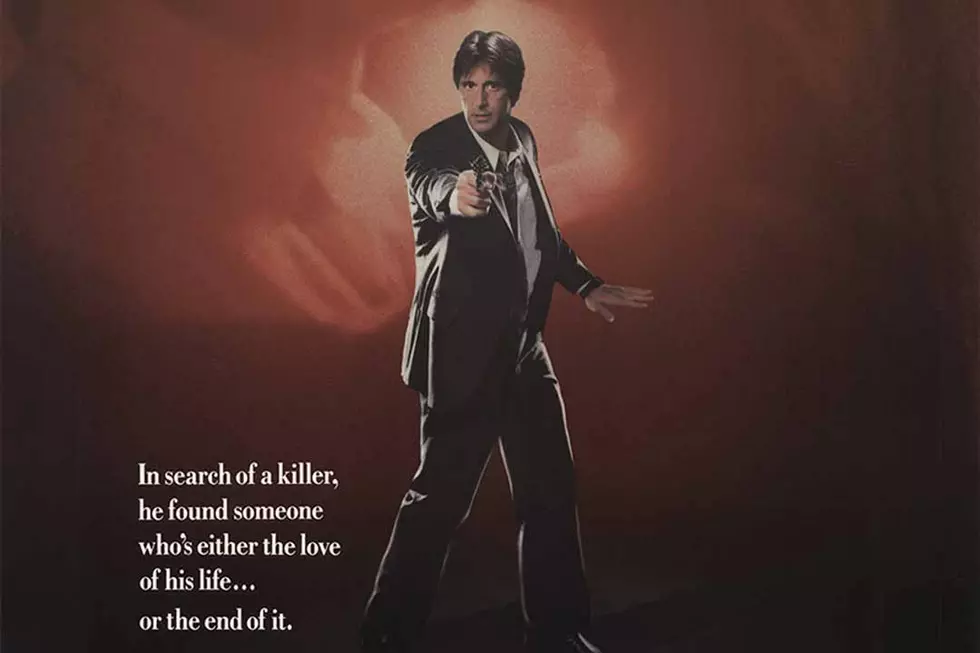
30 Years Ago: Al Pacino Resurrects His Career With ‘Sea of Love’
By 1989, Al Pacino had disappeared from Hollywood. After crafting a place as a screen icon in the '70s, he was no longer really working in movies. Then came Sea of Love.
Prior to that, his last big movie had been Brian DePalma's Scarface six years earlier, and he appeared in only one other film after that, 1985's poorly received Revolution. He had gone back to working on the stage, but as far as the big screen was concerned, it seemed as though there might be no avenue for him to channel his trademark manic intensity as the 49-year-old Pacino transitioned into middle age.
But Sea of Love resurrected Pacino's movie career, returning to name-above-the-title status over the next decade with such films as The Godfather, Part III (1990), Frankie and Johnny (1991), Scent of a Woman and Glengarry Glen Ross (both 1992), Carlito's Way (1993), Heat (1995), The Devil's Advocate and Donnie Brasco (both 1997) and The Insider and Any Given Sunday (both 1999).
He plays Frank Keller, a New York City homicide detective who's been on the force for 20 years and is going through a midlife crisis. His wife has divorced him and married one of his fellow detectives (Richard Jenkins, in another of his long string of pitch-perfect character roles), and he's a raging alcoholic.
Keller's problems come to a head when he's confronted with the case of a woman who's in the habit of answering personal ads in the paper and then killing the men after sleeping with them. Keller and another detective (John Goodman) decide to place their own ad in the hopes of luring her into their clutches. Even though the hard-as-nails precinct chief (John Spencer) declares the plan crazy, dangerous and a waste of taxpayer money, he eventually gives them the go-ahead.
Keller meets with the women who answer the ad for drinks, and eventually one of them, the sexy and mysterious Helen Cruger (Ellen Barkin), becomes a suspect. Keller, drinking too much and making the bad decisions that have come to define him, begins an affair with her. The rest of the film plays cat-and-mouse with the resulting question: Is he sleeping with the killer, or is there someone else lurking in the shadows, waiting for the chance to kill him?
Sea of Love's screenplay was written by Richard Price, a talented screenwriter and novelist who knows his way around the police procedural, and for the most part it works well here. Pacino's character is finely rendered, and one scene after another is smoothly turned. Beyond this, though, it's also an example of how Hollywood shifted from the '80s to the '90s.
The erotic thriller featuring a potentially sexually predatory female has been a staple of Hollywood for almost as long as Hollywood has existed. Many of the film noirs of the '40s and '50s ran along these lines, as did some of the neo-noir and paranoia cycles of the '70s. And while the '80s contained any number of sterling examples – think Body Heat (1981) or Body Double (1984), or even Blue Velvet (1986) – these tended to feel like throwback films or sly parodies.
Watch the 'Sea of Love' Trailer
The '90s, however, saw a boom of sexualized, psychologically oriented thrillers that seemed to arise from the anxieties of the moment, many of which were anticipated by Sea of Love. Basic Instinct (1992) is probably the most emblematic of these, with its dangerous female (Sharon Stone) whose magnetism, like that of Barkin's character, seems to come from its scarily liberated sexuality. Others that followed in Sea of Love's wake included Shattered (1991), Final Analysis (1992), Sliver (1993) and The Last Seduction (1994). These films includes lots of "psychology," a good deal of steamy sex and vast swaths of sexually aggressive women tempting and terrorizing men (and occasionally each other) in various ways.
In this cycle, and in the '90s at large, the prototype for the male leading man changed. The rock'em sock'em '80s action movie hero gave way to someone less bombastic, more gentle, more of an introvert. Out with Arnold Schwarzenegger, in with Keanu Reeves.
Pacino's particular strengths fit flawlessly into this new era. He's a small man with a big personality (Sea of Love is one of his few movies that makes the fact of his stature explicit – he has a martial-arts hobby, he explains, to help him if he gets in a fight with bigger men). He exudes a kind of sexual charm that seems always to mask a sad, underlying knowledge of the world, and his charisma, even at its most radiant, is always wounded in some way.
It's the perfect combination for a middle-aged actor, particularly one who no longer has to compete with overstimulated muscles and lantern jaws. And it's a joy to watch Pacino begin to find the power of it in Sea of Love.
The Best Rock Movie From Every Year: 1955-2018
More From 92.9 The Lake









